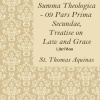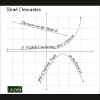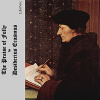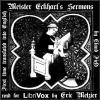Medieval
739
Summary
The Praise of Folly (Greek title: Morias Enkomion (Μωρίας Εγκώμιον), Latin: Stultitiae Laus, sometimes translated as In Praise of Folly, Dutch title: Lof der Zotheid) is a satirical essay written in 1509 by Desiderius Erasmus of Rotterdam (1466/69-1536). It is considered one of the most influential works of literature in Western civilization and one of the catalysts of the Protestant Reformation.It starts off with a satirical learned encomium after the manner of the Greek satirist Lucian, a piece of virtuoso foolery; it then takes a darker tone in a series of orations, as Folly praises self-deception and madness and moves to a satirical examination of pious but superstitious abuses of Catholic doctrine and corrupt practices in parts of the Roman Catholic Church—to which Erasmus was ever faithful—and the folly of pedants (including Erasmus himself). Erasmus had recently returned, disappointed, from Rome, where he had turned down offers of advancement in the curia, and Folly increasingly takes on Erasmus' own chastising voice. The essay ends with a straightforward statement of Christian ideals.
The essay was hugely popular, to Erasmus' astonishment and sometimes his dismay. Before Erasmus' death it had already passed into numerous editions and had been translated into French and German. An English edition soon followed. It influenced teaching of rhetoric during the later sixteenth century. It was put on the Index of forbidden books by the Council in Trent in 1559. (Summary adapted from Wikipedia)
Authorization
By logging in, you agree to the terms and conditions.











No comments